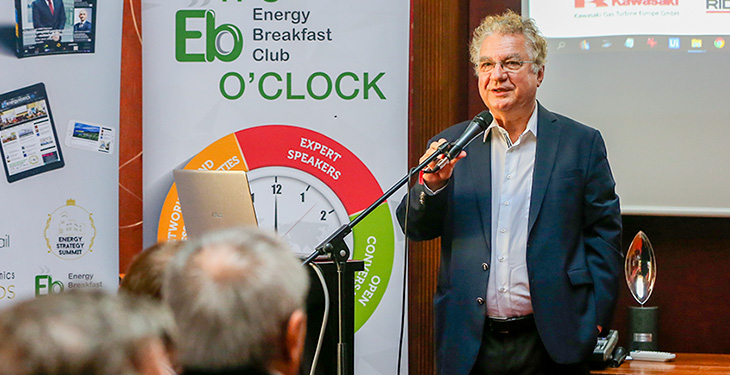The natural gas market made a tough debut in Romania, being strongly influenced by the political factor. The market started operating a few years ago, when both the law and the secondary regulations functioned within normal parameters, says Septimiu Stoica, President of the General Meeting of Shareholders of the Romanian Commodities Exchange – BRM, during the Energy Breakfast Club – Oil & Gas – E&P, Transport and Processing – an event organized by energynomics.ro.
“In respect with trading volumes, our journey has been a fast one and we have managed to create, perhaps, the most representative gas market in this area of Europe, in three to four years. Then followed a period of fierce struggle with the system. For a few years we had to fight in Parliament and we even reached to the European Union in order to resist the maneuvers – and they were not even discreet maneuvers, but aggressive, brutal maneuvers – to be eliminated from the market,” said Stoica.
At the end of last year and the beginning of 2019, through the emergence of GEO 114, the activity of BRM was blown over.
”Between 2013 and 2015 we traded 6.65 TWh. In 2016, 15.5 TWh, in 2017 and 2018, 70 TWh each – almost 70% of the volumes on the gas markets in Romania. What happened from January to May? [We are] well below 1 TWh per month. It was only in June, July and August we exceeded a few TWh: 3 TWh in June, 1 TWh in July and 4 TWh in August. Market operators are trying to come back… Now, with the changes that are foreshadowing, respectively the renunciation of the regulated prices, reintroduced absolutely shockingly on the Romanian market, we hope that things will change,” said Stoica.
Unfortunately, “in the economic world, the returns to normality are not as easy as the exits off normality,” explains Stoica, and “the costs are much higher, the recovery is slow and you do not return exactly to the same point”.
“The good news is that there is hope for a resumption of the growth cycle,” he added.
The effects of GEO 114 were also perverse in terms of prices, not just transactions. “Although I can credit the initiators with positive intentions, actually there has been an increase in prices on the wholesale market. As the big producers are forced to sell at lower prices than the real ones, they had to recover on the domestic wholesale market. It was reached the paradoxical situation that in our market, where prices used to be lower than those in the region, they became higher than those in the region, and even higher than those of imports – which for a resource-rich country is strange, unexpected and unfortunate.”
Energy Breakfast Club was organized by energynomics.ro and supported by our partners: Bursa Română de Mărfuri – BRM, Kawasaki Gas Turbine Europe Gmb, Ridgid – Emerson, The Sniffers.
Over 40 representatives from Academia Română, Actemium, Ambasada Franței, AMS Alconex Metrology, Asprofos SA, Atlantis ProCons SRL, BCR, Bioterpena Sustem, Ambasada Bulgariei, Bursa Română de Mărfuri, COS TGV, cursdeguvernare.ro, ELCEN, Elux Rodit, Emerson, Energie F K, EnergoBit, Enpower, FPPG, Grup OMIR, ING, Jereh, Kawasaki, Mitsubishi Corporation, OMV Petrom, Organismul Național de Stanrdardizare – ASRO, Phoenix Contact, Premier Energy, The Sniffers, WTS Energy attended the presentations and participated in discussions.
Participation
This year, energynomics.ro will organize a least 6 Energy Breakfast Club meetings. The schedule and the proposed themes for 2019 are available in the Energy Breakfast Club dedicated page.

